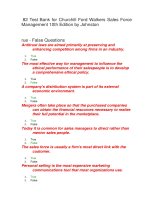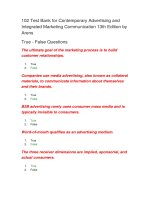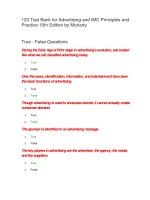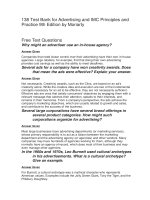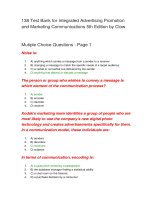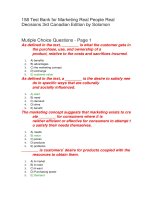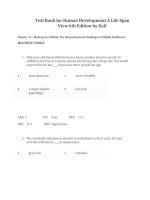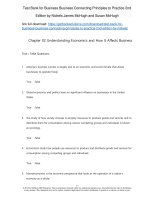Test bank for human development a life span view 7th edition by kail
Bạn đang xem bản rút gọn của tài liệu. Xem và tải ngay bản đầy đủ của tài liệu tại đây (531.84 KB, 51 trang )
Link full download: />
Test Bank for Human Development A Life Span View 7th Edition by
Kail
Sample
Chapter 13
1. Fifty-year-old Esmeralda has been a heavy smoker since her youth. In addition,
she lives in a sunny climate and always has a deep tan. You would expect that she
has ____ than most other people her age.
a. more gray hair
b. a larger middle-aged bulge
c. more wrinkles
d. less hair
ANSWER: c
REFERENCES: 13.1 Physical Changes and Health Physical Changes and Health
LEARNING OBJECTIVES: KAIL.HDEV.16.13.1.1 – How does appearance change in
middle age?
KEYWORDS: Bloom’s: Apply
2. The metabolic slowdown common to individuals in their early 30s and mid-50s
will lead to ____ in many males.
a. gray hair
b. a middle-aged bulge
c. wrinkles
d. hair loss
ANSWER: b
REFERENCES: 13.1 Physical Changes and Health
LEARNING OBJECTIVES: KAIL.HDEV.16.13.1.1 – How does appearance change in
middle age?
KEYWORDS: Bloom’s: Understand
3. Osteoporosis is best thought of as involving a loss of bone
a. brittleness.
b. porousness.
c. hormones.
d. mass.
ANSWER: d
REFERENCES: 13.1 Physical Changes and Health
LEARNING OBJECTIVES: KAIL.HDEV.16.13.1.2 – What changes occur in bones and
joints?
KEYWORDS: Bloom’s: Understand
4. As Dr. Benton is looking at an X-ray of bones in your leg, his comment, ____, would
indicate that you may have osteoporosis.
a. “I see less mass than normal”
b. “I see excessive encapsulation”
c. “I see a significant increase in density”
d. “I see very little plaque”
ANSWER: a
REFERENCES: 13.1 Physical Changes and Health
LEARNING OBJECTIVES: KAIL.HDEV.16.13.1.2 – What changes occur in bones and
joints?
KEYWORDS: Bloom’s: Apply
5. Who is at the greatest risk of currently experiencing osteoporosis?
a. Martha, who is a 20-year-old female
b. George, who is a 30-year-old male
c. Mary, who is a 60-year-old female
d. Abe, who is a 70-year-old male
ANSWER: c
REFERENCES: 13.1 Physical Changes and Health
LEARNING OBJECTIVES: KAIL.HDEV.16.13.1.2 – What changes occur in bones and
joints?
KEYWORDS: Bloom’s: Apply
6. ____ is the leading cause of broken bones in older women.
a. Osteoarthritis
b. Rheumatoid arthritis
c. Osteoporosis
d. Car accidents
ANSWER: c
REFERENCES: 13.1 Physical Changes and Health
LEARNING OBJECTIVES: KAIL.HDEV.16.13.1.2 – What changes occur in bones and
joints?
KEYWORDS: Bloom’s: Understand
7. Forty-five-year-old Marilyn, who is very concerned about osteoporosis, seeks
medical advice from her physician. Which advice would her physician be least likely
to give?
a. “Let’s try increasing your alcohol consumption.”
b. “Let’s try increasing your estrogen level.”
c. “Let’s try increasing your exercise rate.”
d. “Let’s try increasing your calcium consumption.”
ANSWER: a
REFERENCES: 13.1 Physical Changes and Health
LEARNING OBJECTIVES: KAIL.HDEV.16.13.1.2 – What changes occur in bones and
joints?
KEYWORDS: Bloom’s: Apply
8. The rate of osteoporosis is directly affected by the metabolism rate of vitamin
a. A.
b. B.
c. C.
d. D.
ANSWER: d
REFERENCES: 13.1 Physical Changes and Health
LEARNING OBJECTIVES: KAIL.HDEV.16.13.1.2 – What changes occur in bones and
joints?
KEYWORDS: Bloom’s: Understand
9. Connie is a knowledgeable individual so when her physician tells her that she will
be put on a biophosphonate, Connie realizes that she most likely has
a. menopause.
b. high blood pressure.
c. cancer.
d. osteoporosis.
ANSWER: d
REFERENCES: 13.1 Physical Changes and Health
LEARNING OBJECTIVES: KAIL.HDEV.16.13.1.2 – What changes occur in bones and
joints?
KEYWORDS: Bloom’s: Apply
10. Which is best characterized as a “wear-and-tear” disease?
a. Osteoporosis
b. Osteoarthritis
c. Rheumatoid arthritis
d. Menopause
ANSWER: b
REFERENCES: 13.1 Physical Changes and Health
LEARNING OBJECTIVES: KAIL.HDEV.16.13.1.2 – What changes occur in bones and
joints?
KEYWORDS: Bloom’s: Thinking Critically
11. Sixty-year-old Wendell is being examined by his physician. Wendell’s symptoms
include joint pain that has gradually increased. When his doctor says, “Your pain is
due to the damage to your cartilage caused by severe use over your lifetime,” you
should correctly conclude that Wendell will be diagnosed with
a. the climacteric.
b. rheumatoid arthritis.
c. osteoporosis.
d. osteoarthritis.
ANSWER: d
REFERENCES: 13.1 Physical Changes and Health
LEARNING OBJECTIVES: KAIL.HDEV.16.13.1.2 – What changes occur in bones and
joints?
KEYWORDS: Bloom’s: Apply
12. Misha often experiences severe swelling and joint pain in her fingers and wrists
each morning. This pattern of symptoms is most likely due to
a. rheumatoid arthritis.
b. osteoarthritis.
c. the climacteric.
d. osteoporosis.
ANSWER: a
REFERENCES: 13.1 Physical Changes and Health
LEARNING OBJECTIVES: KAIL.HDEV.16.13.1.2 – What changes occur in bones and
joints?
KEYWORDS: Bloom’s: Apply
13. Rheumatoid arthritis ____ osteoarthritis.
a. is another name for
b. impacts different joints than
c. always precedes
d. is a noninflammatory version of
ANSWER: b
REFERENCES: 13.1 Physical Changes and Health
LEARNING OBJECTIVES: KAIL.HDEV.16.13.1.2 – What changes occur in bones and
joints?
KEYWORDS: Bloom’s: Thinking
14. One difference between osteoarthritis and rheumatoid arthritis is that
a. osteoarthritis is not painful.
b. osteoarthritis typically occurs in adolescence.
c. there is more swelling of the joints in rheumatoid arthritis.
d. women are more likely to be affected by rheumatoid arthritis.
ANSWER: c
REFERENCES: 13.1 Physical Changes and Health
LEARNING OBJECTIVES: KAIL.HDEV.16.13.1.2 – What changes occur in bones and
joints?
KEYWORDS: Bloom’s: Thinking
15. Which statement concerning rheumatoid arthritis is true?
a. Individuals with rheumatoid arthritis need to avoid aspirin.
b. Rheumatoid arthritis is inherited.
c. Symptoms of rheumatoid arthritis come and go.
d. Rheumatoid arthritis affects large joints (e.g., hips) but not small joints (e.g.,
fingers).
ANSWER: c
REFERENCES: 13.1 Physical Changes and Health
LEARNING OBJECTIVES: KAIL.HDEV.16.13.1.2 – What changes occur in bones and
joints?
KEYWORDS: Bloom’s: Understand
16. The defining element of “the climacteric” involves the loss of
a. the natural ability to produce children.
b. cancer-fighting agents.
c. emotional stability.
d. blood flow through the circulatory system.
ANSWER: a
REFERENCES: 13.1 Physical Changes and Health
LEARNING OBJECTIVES: KAIL.HDEV.16.13.1.3 – What reproductive changes occur in
men and women in middle age?
KEYWORDS: Bloom’s: Understand
17. While at a checkup, 40-year-old Betty listens as her physician, Dr. White,
describes Betty’s current health. Which of Dr. White’s statements would suggest that
Betty is experiencing the climacteric?
a. “Do genetic disorders run in your family?”
b. “I hope that you have all the children you want.”
c. “The loss of memory will be slow but significant.”
d. “Some of your blood cells have begun to alter their shape.”
ANSWER: b
REFERENCES: 13.1 Physical Changes and Health
LEARNING OBJECTIVES: KAIL.HDEV.16.13.1.3 – What reproductive changes occur in
men and women in middle age?
KEYWORDS: Bloom’s: Apply
18. Fifty-five-year-old Claire stopped menstruating some time ago. She is
disappointed because she really wanted to have more children. What would a
competent physician tell her?
a. “Sorry, your childbearing days are now behind you.”
b. “Just stop taking hormones and you could get pregnant again.”
c. “It may be possible for you to have more children via in vitro fertilization.”
d. “If you do HRT, you have a good chance of getting pregnant.”
ANSWER: a
REFERENCES: 13.1 Physical Changes and Health
LEARNING OBJECTIVES: KAIL.HDEV.16.13.1.3 – What reproductive changes occur in
men and women in middle age?
KEYWORDS: Bloom’s: Apply
19. As women reach the climacteric, their menstruation cycles
a. continue regularly for the remainder of their lives.
b. become irregular and gradually stop altogether.
c. become more and more irregular, but they never completely stop.
d. stop all at once.
ANSWER: b
REFERENCES: 13.1 Physical Changes and Health
LEARNING OBJECTIVES: KAIL.HDEV.16.13.1.3 – What reproductive changes occur in
men and women in middle age?
KEYWORDS: Bloom’s: Understand
20. How are menopause and the climacteric related?
a. Menopause typically ends right before the climacteric.
b. The climacteric typically ends right before menopause.
c. Menopause occurs during the climacteric.
d. Menopause and the climacteric are unrelated.
ANSWER: c
REFERENCES: 13.1 Physical Changes and Health
LEARNING OBJECTIVES: KAIL.HDEV.16.13.1.3 – What reproductive changes occur in
men and women in middle age?
KEYWORDS: Bloom’s: Thinking Critically
21. Shelly is a 46-year-old woman whose menstrual cycle has changed and is now
more irregular and infrequent. Which term best describes Shelly’s condition?
a. Menopause
b. Midlife crisis
c. Perimenopause
d. Encapsulated
ANSWER: c
REFERENCES: 13.1 Physical Changes and Health
LEARNING OBJECTIVES: KAIL.HDEV.16.13.1.3 – What reproductive changes occur in
men and women in middle age?
KEYWORDS: Bloom’s: Apply
22. Which of the following are hormonal-related symptoms of menopause?
a. Poor respiration and hot flashes
b. Hot flashes and vaginal dryness
c. Vaginal dryness and joint stiffness
d. Joint stiffness and poor respiration
ANSWER: b
REFERENCES: 13.1 Physical Changes and Health
LEARNING OBJECTIVES: KAIL.HDEV.16.13.1.3 – What reproductive changes occur in
men and women in middle age?
KEYWORDS: Bloom’s: Understand
23. Perimenopause is accompanied by decreases in ____ and ____ levels.
a. estrogen; progesterone
b. estrogen;testosterone
c. progesterone; cortisol
d. cortisol; testosterone
ANSWER: a
REFERENCES: 13.1 Physical Changes and Health
LEARNING OBJECTIVES: KAIL.HDEV.16.13.1.3 – What reproductive changes occur in
men and women in middle age?
KEYWORDS: Bloom’s: Understand
24. For Beth, menopause just ended. Which change should she expect?
a. Enlarged vaginal walls
b. Enlarged external genitalia
c. Reduced vaginal lubrication
d. Reduced possibility of painful intercourse
ANSWER: c
REFERENCES: 13.1 Physical Changes and Health
LEARNING OBJECTIVES: KAIL.HDEV.16.13.1.3 – What reproductive changes occur in
men and women in middle age?
KEYWORDS: Bloom’s: Apply
25. The primary reason that elderly women show a decline in sexual activity
involves
a. a normal physiological lack of interest.
b. failure to achieve orgasm.
c. the lack of a willing or appropriate partner.
d. pain associated with vaginal changes.
ANSWER: c
REFERENCES: 13.1 Physical Changes and Health
LEARNING OBJECTIVES: KAIL.HDEV.16.13.1.3 – What reproductive changes occur in
men and women in middle age?
KEYWORDS: Bloom’s: Understand
26. Serina is looking forward to menopause and aging. Based on this information,
what is Serina’s ethnic background?
a. Asian
b. Middle Eastern
c. European American
d. Mayan
ANSWER: d
REFERENCES: 13.1 Physical Changes and Health
LEARNING OBJECTIVES: KAIL.HDEV.16.13.1.3 – What reproductive changes occur in
men and women in middle age?
KEYWORDS: Bloom’s: Understand
27. Declining levels of estrogen typically do not increase the risk of
a. osteoporosis.
b. memory loss.
c. weight loss.
d. cardiovascular disease.
ANSWER: c
REFERENCES: 13.1 Physical Changes and Health
LEARNING OBJECTIVES: KAIL.HDEV.16.13.1.3 – What reproductive changes occur in
men and women in middle age?
KEYWORDS: Bloom’s: Understand
28. Albine’s physician has just informed her that she will need to begin hormone
replacement therapy. In addition to estrogen, what hormone should Albine expect to
be replaced?
a. Dopamine
b. Testosterone
c. Serotonin
d. Progesterone
ANSWER: d
REFERENCES: 13.1 Physical Changes and Health
LEARNING OBJECTIVES: KAIL.HDEV.16.13.1.3 – What reproductive changes occur in
men and women in middle age?
KEYWORDS: Bloom’s: Apply
29. Results from the Women’s Health Initiative study begun in 1991 revealed that
the risk for ____ decreased in those taking estrogen plus progestin.
a. hip fractures
b. blood clots
c. breast cancer
d. heart attack
ANSWER: a
REFERENCES: 13.1 Physical Changes and Health
LEARNING OBJECTIVES: KAIL.HDEV.16.13.1.3 – What reproductive changes occur in
men and women in middle age?
KEYWORDS: Bloom’s: Understand
30. Yasmin is told that she will be taking selective estrogen receptor modulators
(SERMs). What medical condition is most likely being treated?
a. High blood pressure
b. Menopause
c. Breast cancer
d. Rheumatoid arthritis
ANSWER: b
REFERENCES: 13.1 Physical Changes and Health
LEARNING OBJECTIVES: KAIL.HDEV.16.13.1.3 – What reproductive changes occur in
men and women in middle age?
KEYWORDS: Bloom’s: Apply
31. At what age is women’s risk of cardiovascular disease equal to that of men’s?
a. 50
b. 40
c. 60
d. 30
ANSWER: c
REFERENCES: 13.1 Physical Changes and Health
LEARNING OBJECTIVES: KAIL.HDEV.16.13.1.3 – What reproductive changes occur in
men and women in middle age?
KEYWORDS: Bloom’s: Understand
32. Tom has always wanted to be a father but has not yet found an acceptable
partner. He is now 35 years old, healthy, and beginning to be concerned about how
much longer he will remain fertile. When he asks his doctor about this, his doctor
tells him that he will probably be capable of fathering a child
a. until he is about 45 years old.
b. until he is about 65 years old.
c. until he is about 85 years old.
d. for the rest of his life.
ANSWER: d
REFERENCES: 13.1 Physical Changes and Health
LEARNING OBJECTIVES: KAIL.HDEV.16.13.1.3 – What reproductive changes occur in
men and women in middle age?
KEYWORDS: Bloom’s: Apply
33. Some males experience an age-related decline in ____ resulting in menopauselike symptoms.
a. testosterone
b. dopamine
c. estrogen
d. progestin
ANSWER: a
REFERENCES: 13.1 Physical Changes and Health
LEARNING OBJECTIVES: KAIL.HDEV.16.13.1.3 – What reproductive changes occur in
men and women in middle age?
KEYWORDS: Bloom’s: Understand
34. As a typical middle-aged male, Rasheed will most likely experience
a. a brief increase in sperm production.
b. a shorter resolution phase.
c. a prostate gland that becomes enlarged.
d. more perceived demand to ejaculate.
ANSWER: c
REFERENCES: 13.1 Physical Changes and Health
LEARNING OBJECTIVES: KAIL.HDEV.16.13.1.3 – What reproductive changes occur in
men and women in middle age?
KEYWORDS: Bloom’s: Apply
35. The loss of an available partner in older age
a. is a factor in the decrease in sexual intercourse for both men and women.
b. is a factor in the decrease in sexual intercourse for men but not for women.
c. is a factor in the decrease in sexual intercourse for women but not for men.
d. is not a factor in the decrease in sexual intercourse for men or women.
ANSWER: a
REFERENCES: 13.1 Physical Changes and Health
LEARNING OBJECTIVES: KAIL.HDEV.16.13.1.3 – What reproductive changes occur in
men and women in middle age?
KEYWORDS: Bloom’s: Understand
36. Who is likely to experience the most job-related stress?
a. Tina, who has complete control over her job
b. Lena, who has moderate control over her job
c. Katrina, who has some control over her job
d. Deena, who has no control over her job
ANSWER: d
REFERENCES: 13.1 Physical Changes and Health
LEARNING OBJECTIVES: KAIL.HDEV.16.13.1.4 – What is stress? How does it affect
physical and psychological health?
KEYWORDS: Bloom’s: Apply
37. For which occupation would you expect the least stress-related health
problems?
a. Social worker
b. CEO of a computer company
c. Truck driver
d. Waiter
ANSWER: b
REFERENCES: 13.1 Physical Changes and Health
KEYWORDS: Bloom’s: Apply
38. Compared to the average middle-aged man, the average middle-aged woman
tends to rate stressful experiences
a. less negatively and to report more stress in family areas.
b. experiences more negatively and to report more stress in family areas.
c. experiences less negatively and to report more stress in financial areas.
d. experiences more negatively and to report more stress in financial areas.
ANSWER: b
REFERENCES: 13.1 Physical Changes and Health
LEARNING OBJECTIVES: KAIL.HDEV.16.13.1.3 – What reproductive changes occur in
men and women in middle age?
KEYWORDS: Bloom’s: Understand
39. The stress and coping paradigm focuses on the interactive relationship between
a. person and environment.
b. mind and body.
c. hormones and neurotransmitters.
d. family and work.
ANSWER: a
REFERENCES: 13.1 Physical Changes and Health
LEARNING OBJECTIVES: KAIL.HDEV.16.13.1.4 – What is stress? How does it affect
physical and psychological health?
KEYWORDS: Bloom’s: Understand
40. Analyzing how a person thinks about her job and how that job situation ends up
affecting the individual both psychologically and physically would be an example of
an application of the
a. encapsulation pattern.
b. Type A behavior pattern.
c. stress and coping paradigm.
d. generativity versus stagnation paradigm.
ANSWER: c
REFERENCES: 13.1 Physical Changes and Health
LEARNING OBJECTIVES: KAIL.HDEV.16.13.1.4 – What is stress? How does it affect
physical and psychological health?
KEYWORDS: Bloom’s: Thinking Critically
41. Joy reads a note on her desk that says, “Joy, come to my office immediately.
Signed, The Boss.” Joy immediately interprets this message as a threat to her job and
her livelihood and is not sure she can deal with it. Joy’s interpretation of this note
exemplifies
a. coping.
b. an appraisal.
c. stagnation.
d. filial obligation.
ANSWER: b
REFERENCES: 13.1 Physical Changes and Health
LEARNING OBJECTIVES: KAIL.HDEV.16.13.1.4 – What is stress? How does it affect
physical and psychological health?
KEYWORDS: Bloom’s: Apply
42. Coping is defined as any
a. attempt to deal with stress.
b. attempt to deal with stress that is repeated on at least two occasions.
c. rational attempt to deal with stress.
d. successful attempt to deal with stress.
ANSWER: a
REFERENCES: 13.1 Physical Changes and Health
LEARNING OBJECTIVES: KAIL.HDEV.16.13.1.4 – What is stress? How does it affect
physical and psychological health?
KEYWORDS: Bloom’s: Understand
43. Heather is experiencing a great deal of stress. She has tried relaxation training,
thinking about life events in a different way, and even talking to her friends. All of
these strategies are best classified as attempts at
a. repression.
b. coping.
c. stagnation.
d. appraisal.
ANSWER: b
REFERENCES: 13.1 Physical Changes and Health
LEARNING OBJECTIVES: KAIL.HDEV.16.13.1.4 – What is stress? How does it affect
physical and psychological health?
KEYWORDS: Bloom’s: Apply
44. Stress has been shown to decrease
a. angina.
b. risk for irritable bowel syndrome.
c. cholesterol levels.
d. estrogen levels.
ANSWER: d
REFERENCES: 13.1 Physical Changes and Health
LEARNING OBJECTIVES: KAIL.HDEV.16.13.1.4 – What is stress? How does it affect
physical and psychological health?
KEYWORDS: Bloom’s: Understand
45. _____ is the process by which we categorize events into three groups based on the
significance they have on our well-being: irrelevant, positive, or stressful.
a. Secondary appraisal
b. Menopause
c. Primary appraisal
d. Rappraisal
ANSWER: c
REFERENCES: 13.1 Physical Changes and Health
LEARNING OBJECTIVES: KAIL.HDEV.16.13.1.4 – What is stress? How does it affect
physical and psychological health?
KEYWORDS: Bloom’s: Thinking Critically
46. Tabitha just had a conversation with her boss in which he told her that there
would be some future layoffs due to budget cuts. Tabitha feels an increase in stress
due to the conversation with her boss. She would be best described as experiencing
a. primary appraisal.
b. secondary appraisal.
c. reappraisal.
d. post-appraisal.
ANSWER: a
REFERENCES: 13.1 Physical Changes and Health
LEARNING OBJECTIVES: KAIL.HDEV.16.13.1.4 – What is stress? How does it affect
physical and psychological health?
KEYWORDS: Bloom’s: Apply
47. What is the name for the process we experience when we evaluate our ability to
cope with a challenge?
a. Post-appraisal
b. Secondary appraisal
c. Primary appraisal
d. Reappraisal
ANSWER: b
REFERENCES: 13.1 Physical Changes and Health
LEARNING OBJECTIVES: KAIL.HDEV.16.13.1.4 – What is stress? How does it affect
physical and psychological health?
KEYWORDS: Bloom’s: Understand
48. Stacy has lost her wallet with all of her cash, credit cards, and identification in it.
She asks herself, “What can I do about this?” Stacy is in the ____ process.
a. reappraisal
b. secondary appraisal
c. post-appraisal
d. primary appraisal
ANSWER: b
REFERENCES: 13.1 Physical Changes and Health
LEARNING OBJECTIVES: KAIL.HDEV.16.13.1.4 – What is stress? How does it affect
physical and psychological health?
KEYWORDS: Bloom’s: Apply
49. Jen has heard that Ben is cheating on her, but does not believe it. However, after
being shown pictures of Ben interacting romantically with another woman, Jen
believes him to be cheating and feels more stress. Jen is experiencing
a. reappraisal.
b. post-appraisal.
c. primary appraisal.
d. secondary appraisal.
ANSWER: a
REFERENCES: 13.1 Physical Changes and Health
LEARNING OBJECTIVES: KAIL.HDEV.16.13.1.4 – What is stress? How does it affect
physical and psychological health?
KEYWORDS: Bloom’s: Thinking Critically
50. Sylvester is extremely anxious about an upcoming physics exam. He cancels his
plans with his friends and stays home to study an extra day. Sylvester is practicing
a. emotion-focused coping.
b. appraisal.
c. mindfulness-based stress reduction.
d. problem-focused coping.
ANSWER: d
REFERENCES: 13.1 Physical Changes and Health
LEARNING OBJECTIVES: KAIL.HDEV.16.13.1.4 – What is stress? How does it affect
physical and psychological health?
KEYWORDS: Bloom’s: Apply
51. Yoga and meditation are examples of
a. aerobic exercise.
b. primary appraisal.
c. mindfulness-based stress reduction.
d. secondary appraisal.
ANSWER: c
REFERENCES: 13.1 Physical Changes and Health
LEARNING OBJECTIVES: KAIL.HDEV.16.13.1.4 – What is stress? How does it affect
physical and psychological health?
KEYWORDS: Bloom’s: Thinking Critically
52. After being robbed at gunpoint at night, Chelsea is anxious and is afraid to leave
her house after dark. Chelsea is experiencing symptoms of
a. depression.
b. post-traumatic stress disorder.
c. stress reduction.
d. cardiovascular disease.
ANSWER: b
REFERENCES: 13.1 Physical Changes and Health
LEARNING OBJECTIVES: KAIL.HDEV.16.13.1.4 – What is stress? How does it affect
physical and psychological health?
KEYWORDS: Bloom’s: Understand
53. Exercise
a. is not related to physical health.
b. can significantly slow the aging process.
c. is beneficial to health but does not affect the aging process.
d. should be avoided by people over 50 years old.
ANSWER: b
REFERENCES: 13.1 Physical Changes and Health
LEARNING OBJECTIVES: KAIL.HDEV.16.13.1.5 – What benefits are there to exercise?
KEYWORDS: Bloom’s: Understand
54. Aerobic exercise is defined as a pulse rate between ____ percent of a person’s
maximum rate.
a. 40-70
b. 50-80
c. 60-90
d. 70-100
ANSWER: c
REFERENCES: 13.1 Physical Changes and Health
LEARNING OBJECTIVES: KAIL.HDEV.16.13.1.5 – What benefits are there to exercise?
KEYWORDS: Bloom’s: Understand
55. Which runner is engaging in aerobic exercise?
a. John, a 20-year-old whose heart rate is 210
b. Denver, a 40-year-old whose heart rate is 100
c. Sean, a 50-year-old whose heart rate is 130
d. Austin, a 90 years old whose heart rate is 50
ANSWER: c
REFERENCES: 13.1 Physical Changes and Health
LEARNING OBJECTIVES: KAIL.HDEV.16.13.1.5 – What benefits are there to exercise?
KEYWORDS: Bloom’s: Apply
56. A person’s maximum heart rate is calculated by subtracting his or her age from
a. 100.
b. 160.
c. 220.
d. 280.
ANSWER: c
REFERENCES: 13.1 Physical Changes and Health
LEARNING OBJECTIVES: KAIL.HDEV.16.13.1.5 – What benefits are there to exercise?
KEYWORDS: Bloom’s: Understand
57. Max engages in regular aerobic exercise. Relative to those who do not exercise,
Max is likely to
a. be more depressed.
b. function better cognitively.
c. show inhibited oxygen consumption.
d. have higher blood pressure.
ANSWER: b
REFERENCES: 13.1 Physical Changes and Health
LEARNING OBJECTIVES: KAIL.HDEV.16.13.1.5 – What benefits are there to exercise?
KEYWORDS: Bloom’s: Apply
58. ____ intelligence is defined as involving the skills and knowledge necessary for
adapting to one’s physical and social environment.
a. Fluid
b. Traditional
c. Practical
d. Unexercised
ANSWER: c
REFERENCES: 13.2 Cognitive Development
LEARNING OBJECTIVES: KAIL.HDEV.16.13.2.1 – How does practical intelligence
develop in adulthood?
KEYWORDS: Bloom’s: Understand
59. Though Elsa does not score particularly high on traditional intelligence tests, she
is very good at understanding income tax forms, can deal well with all different
kinds of people, and is a good troubleshooter around the home and office. Elsa
exhibits
a. concrete thinking.
b. fluid intelligence.
c. high unexercised ability.
d. practical intelligence.
ANSWER: d
REFERENCES: 13.2 Cognitive Development
LEARNING OBJECTIVES: KAIL.HDEV.16.13.2.1 – How does practical intelligence
develop in adulthood?
KEYWORDS: Bloom’s: Apply
60. Dr. Zorba is giving 44-year-old Annette an intelligence test. Annette finds that
she really likes answering the questions because they seem to be based on her life
experiences. Dr. Zorba is most likely attempting to assess Annette’s
a. practical intelligence.
b. generativity.
c. ego resilience.
d. fluid intelligence.
ANSWER: a
REFERENCES: 13.2 Cognitive Development
LEARNING OBJECTIVES: KAIL.HDEV.16.13.2.1 – How does practical intelligence
develop in adulthood?
KEYWORDS: Bloom’s: Apply
61. Which is the best example of a measure of practical intelligence?
a. The MMPI
b. The Stanford-Binet
c. Knowing how to balance a checkbook
d. Knowing the square root of every number less than 100
ANSWER: c
REFERENCES: 13.2 Cognitive Development
LEARNING OBJECTIVES: KAIL.HDEV.16.13.2.1 – How does practical intelligence
develop in adulthood?
KEYWORDS: Bloom’s: Thinking Critically
62. Which of the following is true about real-life problems?
a. People are not motivated to solve them.
b. Personal experience is irrelevant.
c. They have more than one correct answer.
d. They are very similar to traditional tests of intelligence.
ANSWER: c
REFERENCES: 13.2 Cognitive Development
LEARNING OBJECTIVES: KAIL.HDEV.16.13.2.1 – How does practical intelligence
develop in adulthood?
KEYWORDS: Bloom’s: Understand
63. Dharma is upset with the lack of manners her husband Greg displays while
eating, so she looks away or leaves the table each time her husband behaves this
way. Dharma’s response is best classified as
a. a cognitive analysis.
b. passive-dependent.
c. avoidant thinking.
d. problem-focused action.
ANSWER: b
REFERENCES: 13.2 Cognitive Development
LEARNING OBJECTIVES: KAIL.HDEV.16.13.2.1 – How does practical intelligence
develop in adulthood?
KEYWORDS: Bloom’s: Apply
64. When confronted with a problem in his relationships with his wife, Frank scoffs
it off, saying “Ahhh, that’s not really an issue…it will work itself out.” This is
probably best classified as
a. cognitive analysis.
b. avoidant thinking.
c. passive-dependent behavior.
d. problem-focused action.
ANSWER: b
REFERENCES: 13.2 Cognitive Development
LEARNING OBJECTIVES: KAIL.HDEV.16.13.2.1 – How does practical intelligence
develop in adulthood?
KEYWORDS: Bloom’s: Apply
65. McGuyver is trapped in a room with seemingly no way out. While contemplating
his escape, he thinks about how part of the bed in the room could be used to make a
helicopter. This practical thought is best classified as
a. problem-focused action.
b. cognitive analysis.
c. avoidant thinking.
d. denial.
ANSWER: b
REFERENCES: 13.2 Cognitive Development
LEARNING OBJECTIVES: KAIL.HDEV.16.13.2.1 – How does practical intelligence
develop in adulthood?
KEYWORDS: Bloom’s: Apply
66. What would best be classified as an instrumental task?
a. Taking an IQ test
b. Teaching at a college
c. Climbing Mount Everest
d. Driving to work
ANSWER: d
REFERENCES: 13.2 Cognitive Development
LEARNING OBJECTIVES: KAIL.HDEV.16.13.2.1 – How does practical intelligence
develop in adulthood?
KEYWORDS: Bloom’s: Apply
67. According to research by Blanchard-Fields (2007), ____ of an middle-aged adult
would most likely to be dealt with via avoidance-denial.
a. death of a spouse
b. buying groceries
c. mowing the lawn
d. writing a thank you note
ANSWER: a
REFERENCES: 13.2 Cognitive Development
LEARNING OBJECTIVES: KAIL.HDEV.16.13.2.1 – How does practical intelligence
develop in adulthood?
KEYWORDS: Bloom’s: Thinking Critically
68. Who is most likely to deal with an instrumental problem using a problemfocused strategy?
a. 10-year-old Buddy
b. 20-year-old Holly
c. 30-year-old Ray
d. 40-year-old Charles
ANSWER: d
REFERENCES: 13.2 Cognitive Development
LEARNING OBJECTIVES: KAIL.HDEV.16.13.2.1 – How does practical intelligence
develop in adulthood?
KEYWORDS: Bloom’s: Apply
69. Based on research, which of the following statements best summarizes how
middle-aged adults solve problems?
a. Middle-aged adults solve all problems with a problem-focused approach.
b. Middle-aged adults solve all problems with a passive-dependent approach.
c. Middle-aged adults solve problems similarly regardless of the emotional issues
involved.
d. Middle-aged adults solve problems differently depending on the type of problem.
ANSWER: d
REFERENCES: 13.2 Cognitive Development
LEARNING OBJECTIVES: KAIL.HDEV.16.13.2.1 – How does practical intelligence
develop in adulthood?
KEYWORDS: Bloom’s: Apply
70. What description does not accurately describe the skills that people with high
practical intelligence have?
a. People with higher practical intelligence come up with more efficient ways to
solve problems in daily life.
b. People with higher practical intelligence are able to deal with change more
quickly.
c. People with higher practical intelligence are able to persuade people to change the
way they do things.
d. People with higher practical intelligence plan more effectively to prevent
problems.
ANSWER: d
REFERENCES: 13.2 Cognitive Development
LEARNING OBJECTIVES: KAIL.HDEV.16.13.2.1 – How does practical intelligence
develop in adulthood?
KEYWORDS: Bloom’s: Thinking Critically
71. The mechanics of intelligence best fits with which description?
a. Experienced-based
b. Neurophysiological
c. Content-rich
d. Culturally dependent
ANSWER: b
REFERENCES: 13.2 Cognitive Development
LEARNING OBJECTIVES: KAIL.HDEV.16.13.2.1 – How does practical intelligence
develop in adulthood?
KEYWORDS: Bloom’s: Thinking Critically
72. The ____ of intelligence is most likely to be affected by the culture in which you
were raised.
a. process of thinking
b. mechanics
c. information processing
d. pragmatics
ANSWER: d
REFERENCES: 13.2 Cognitive Development
LEARNING OBJECTIVES: KAIL.HDEV.16.13.2.1 – How does practical intelligence
develop in adulthood?
KEYWORDS: Bloom’s: Thinking Critically
73. Mechanics of intelligence is to pragmatics of intelligence as
a. thoughts are to hormones.
b. battery is to automobile.
c. fluid is to crystallized.
d. real life is to theoretical
ANSWER: c
REFERENCES: 13.2 Cognitive Development
LEARNING OBJECTIVES: KAIL.HDEV.16.13.2.1 – How does practical intelligence
develop in adulthood?
KEYWORDS: Bloom’s: Thinking Critically
74. The “biological process of thinking” would be best associated with
a. neuroticism.
b. the mechanics of intelligence.
c. cultural influences.
d. the pragmatics of intelligence.
ANSWER: b
REFERENCES: 13.2 Cognitive Development
LEARNING OBJECTIVES: KAIL.HDEV.16.13.2.1 – How does practical intelligence
develop in adulthood?
KEYWORDS: Bloom’s: Thinking Critically
75. Which term does not belong with the rest?
a. Pragmatics of intelligence
b. Mechanics of intelligence
c. Psychological force impact on intelligence
d. Sociocultural force impact on intelligence
ANSWER: b
REFERENCES: 13.2 Cognitive Development
LEARNING OBJECTIVES: KAIL.HDEV.16.13.2.1 – How does practical intelligence
develop in adulthood?
KEYWORDS: Bloom’s: Thinking Critically
76. Which best exemplifies a sociocultural impact on intelligence?
a. Learning how to drive by practicing driving
b. Americans who fear those from the Middle East following the 9/11 attacks
c. An increase in synaptic connections that results in a higher test score
d. Learning to cook by reading a cookbook
ANSWER: b
REFERENCES: 13.2 Cognitive Development
LEARNING OBJECTIVES: KAIL.HDEV.16.13.2.1 – How does practical intelligence
develop in adulthood?
KEYWORDS: Bloom’s: Apply
77. Which describes the normal pattern of pragmatics and mechanics intelligence
development between ages 25 and 70?
a. Both pragmatics and mechanics increase with age.
b. Both pragmatics and mechanics decrease with age.
c. Pragmatics remains constant while mechanics decreases.
d. Mechanics remains constant while pragmatics decreases.
ANSWER: c
REFERENCES: 13.2 Cognitive Development
LEARNING OBJECTIVES: KAIL.HDEV.16.13.2.1 – How does practical intelligence
develop in adulthood?
KEYWORDS: Bloom’s: Understand
78. Paula is an expert on the history of rock music while Donald is a novice. This
means that Paula ____ than Donald.
a. is less curious about rock music
b. is more intelligent
c. uses more steps in the thinking process when coming up with answers about rock
music
d. is more effective at determining correct solutions concerning rock music
ANSWER: d
REFERENCES: 13.2 Cognitive Development
LEARNING OBJECTIVES: KAIL.HDEV.16.13.2.2 – How does a person become an
expert?
KEYWORDS: Bloom’s: Apply
79. How is expert problem-solving different from problem-solving by a novice?
a. Novices are more curious
b. Experts come to solutions faster
c. Novices follow fewer rules
d. Experts demonstrate less flexibility in thought
ANSWER: b
REFERENCES: 13.2 Cognitive Development
LEARNING OBJECTIVES: KAIL.HDEV.16.13.2.2 – How does a person become an
expert?
KEYWORDS: Bloom’s: Understand
80. Which of the following is one of the outcomes of expertise?
a. An increase in the ability to explain how one arrives at a particular answer
b. Less flexible thinking
c. Less focused thinking
d. A decrease in the ability to explain how one arrives at a particular answer
ANSWER: d
REFERENCES: 13.2 Cognitive Development
LEARNING OBJECTIVES: KAIL.HDEV.16.13.2.2 – How does a person become an
expert?
KEYWORDS: Bloom’s: Understand
81. Which of the following is true about expertise?
a. It is inefficient.
b. It is inflexible.
c. It is selective.
d. It cannot be learned.
ANSWER: c
REFERENCES: 13.2 Cognitive Development
LEARNING OBJECTIVES: KAIL.HDEV.16.13.2.2 – How does a person become an
expert?
KEYWORDS: Bloom’s: Apply
82. One negative effect of expertise is the
a. inability to solve practical problems.
b. loss of the ability to explain why you came to a correct solution.
c. increase in the time that is takes to solve a task.
d. loss of other knowledge in the same area.
ANSWER: b
REFERENCES: 13.2 Cognitive Development
LEARNING OBJECTIVES: KAIL.HDEV.16.13.2.2 – How does a person become an
expert?
KEYWORDS: Bloom’s: Thinking Critically
83. Expert performance tends to peak in ____ and drop off ____.
a. young adulthood; significantly thereafter
b. young adulthood; slightly thereafter
c. middle adulthood; significantly thereafter
d. middle adulthood; slightly thereafter
ANSWER: d
REFERENCES: 13.2 Cognitive Development
LEARNING OBJECTIVES: KAIL.HDEV.16.13.2.2 – How does a person become an
expert?
KEYWORDS: Bloom’s: Understand
84. What is an example of an internal motivator for adults to learn something new?
a. Job promotion
b. Family time
c. Personal satisfaction
d. Pay raise
ANSWER: c
REFERENCES: 13.2 Cognitive Development
LEARNING OBJECTIVES: KAIL.HDEV.16.13.2.3 – What is meant by lifelong learning?
What differences are there between adults and young people in how they learn?
KEYWORDS: Bloom’s: Understand
85. Darejeh and Singh (2014) concluded that self-learning is improved by taking ____
differences into account.
a. instructor
b. learner
c. generativity
d. external motivators
ANSWER: b
REFERENCES: 13.2 Cognitive Development
LEARNING OBJECTIVES: KAIL.HDEV.16.13.2.3 – What is meant by lifelong learning?
What differences are there between adults and young people in how they learn?
KEYWORDS: Bloom’s: Understand
86. Which statement between adult learners and their younger counterparts is true?
a. Adults are more willing to learn about abstract problems.
b. Adults tend to be more motivated by internal factors.
c. Younger learners tend to have a larger variety of experiences on which they can
build.
d. Younger learners have a higher need to know why they should learn something.
ANSWER: b
REFERENCES: 13.2 Cognitive Development
LEARNING OBJECTIVES: KAIL.HDEV.16.13.2.3 – What is meant by lifelong learning?
What differences are there between adults and young people in how they learn?
KEYWORDS: Bloom’s: Thinking Critically
87. At which age is the debate of personality stability versus change most heated?
a. The teen years
b. Young adulthood
c. Middle age
d. Old age
ANSWER: c
REFERENCES: 13.3 Personality
LEARNING OBJECTIVES: KAIL.HDEV.16.13.3.1 – What is the five-factor model? What
evidence is there for stability in personality traits?
KEYWORDS: Bloom’s: Understand
88. Costa and McCrae’s model of personality, which includes dimensions like
conscientiousness, neuroticism, and openness to experience, is commonly referred
to as the ____ model.
a. humanistic
b. centrality
c. five-factor
d. psychodynamic
ANSWER: c
REFERENCES: 13.3 Personality
LEARNING OBJECTIVES: KAIL.HDEV.16.13.3.1 – What is the five-factor model? What
evidence is there for stability in personality traits?
KEYWORDS: Bloom’s: Understand
89. What are the five factors in the five-factor model?
a. Types of intelligence
b. Abilities
c. Stress and coping processes
d. Dimensions/traits
ANSWER: d
REFERENCES: 13.3 Personality
LEARNING OBJECTIVES: KAIL.HDEV.16.13.3.1 – What is the five-factor model? What
evidence is there for stability in personality traits?
KEYWORDS: Bloom’s: Thinking Critically
90. An individual low on the ____ characteristic would likely be described as eventempered and comfortable.
a. neuroticism
b. openness to experience
c. conscientiousness
d. agreeableness
ANSWER: a
REFERENCES: 13.3 Personality
LEARNING OBJECTIVES: KAIL.HDEV.16.13.3.1 – What is the five-factor model? What
evidence is there for stability in personality traits?
KEYWORDS: Bloom’s: Thinking Critically
91. Regis is asked to describe what it is like to work with Kathy Lee. In response, he
says, “She is mean, anxious, and really self-conscious.” This description best matches
a person scoring high on Costa and McCrae’s ____ personality dimension.
a. neuroticism
b. openness to experience
c. extroversion
d. agreeableness
ANSWER: a
REFERENCES: 13.3 Personality
LEARNING OBJECTIVES: KAIL.HDEV.16.13.3.1 – What is the five-factor model? What
evidence is there for stability in personality traits?
KEYWORDS: Bloom’s: Apply
92. If Barney is accurately described as being very even-tempered and unemotional,
he would likely score very low on a test of
a. openness to new experience.
b. agreeableness.
c. encapsulation.
d. neuroticism.
ANSWER: d
REFERENCES: 13.3 Personality
LEARNING OBJECTIVES: KAIL.HDEV.16.13.3.1 – What is the five-factor model? What
evidence is there for stability in personality traits?
KEYWORDS: Bloom’s: Apply
93. Newt is known for being very opinionated, extremely sociable, and loving a
challenge. According to the Five-Factor model, Newt is best thought of as being
a. neurotic.
b. introverted.
c. extroverted.
d. agreeable.
ANSWER: c
REFERENCES: 13.3 Personality
LEARNING OBJECTIVES: KAIL.HDEV.16.13.3.1 – What is the five-factor model? What
evidence is there for stability in personality traits?
KEYWORDS: Bloom’s: Apply
94. Since she has what Costa and McCrae would classify as a “highly extroverted”
personality, you would expect that Samantha would be described by others as
a. “a psychopath.”
b. “nice as you could imagine.”
c. “lazy and disorganized.”
d. “loving the spotlight.”
ANSWER: d
REFERENCES: 13.3 Personality
LEARNING OBJECTIVES: KAIL.HDEV.16.13.3.1 – What is the five-factor model? What
evidence is there for stability in personality traits?
KEYWORDS: Bloom’s: Apply
95. Kevin is described by friends as having a great imagination and being willing to
try anything once. Given this description, Kevin would most likely score very high
on a scale of
a. agreeableness.
b. openness to experience.
c. neuroticism.
d. conscientiousness.
ANSWER: b
REFERENCES: 13.3 Personality
LEARNING OBJECTIVES: KAIL.HDEV.16.13.3.1 – What is the five-factor model? What
evidence is there for stability in personality traits?
KEYWORDS: Bloom’s: Apply
96. Which trait fits someone who scores low on an openness to experience
assessment?
a. Risk-taking
b. Antagonistic
c. Ambitious
d. Uncurious
ANSWER: d
REFERENCES: 13.3 Personality
LEARNING OBJECTIVES: KAIL.HDEV.16.13.3.1 – What is the five-factor model? What
evidence is there for stability in personality traits?
KEYWORDS: Bloom’s: Thinking Critically
97. Because she has what Costa and McCrae would classify as an “agreeable”
personality, you would expect that Marcy would be described by others as a
a. “wallflower.”
